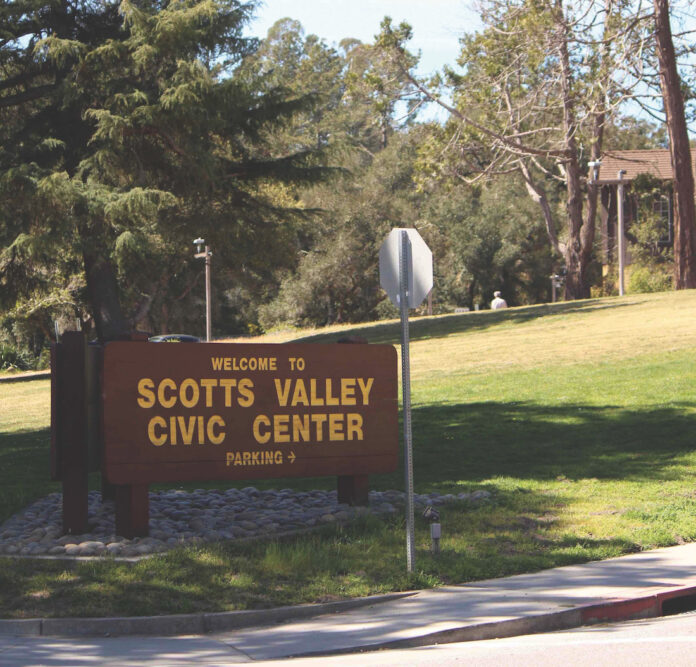Around the bend of the San Lorenzo River from a section recently rehabilitated with long grasses, buzzing insects and wildflowers, bicycle carcasses lay strewn outside a tent. An intricate woodcarving adorned the entrance to another. A dog carried a skateboard in its mouth, tugging a woman along, as hip-hop music snaked its way through the Benchlands.
On the riverbank, two individuals huddled close together appeared to be conducting an illicit transaction. And just up the hill, a scraggly young man speaks in the mumble characteristic of someone making their drug-marketing purpose clear, while still putting on airs laced with heavy deniability. It was the evening of April 6, and the sun was setting behind downtown Santa Cruz vegetation and office buildings. The menacing flash flooding of December was a distant memory.
About six miles up the hill toward Silicon Valley, this scene was very much in the minds of Scotts Valley’s City Council. They were focused on dealing with the fallout from a different sort of drug-marketing operation, a vast network of enterprises that peddled one of the exact same substances—opium-based—authorities say is sold throughout Santa Cruz County streets. The local elected officials fretted that money on the way from drug companies who victimized populations like in the tent village might go toward unsupervised safe-injection resources.
Councilman Jack Dilles pulled an item about an incoming legal settlement funding from the consent agenda to raise his concerns.
At issue was $243,476 to be disbursed to Scotts Valley over 18 years—or about $13,500 annually—following litigation involving distributors AmerisourceBergen, Cardinal Health, and McKesson, and the opioid painkiller manufacturer Janssen, which is owned by Johnson & Johnson.
Because Scotts Valley opted-in to the settlement, it has released the companies from further liability claims.
“This level of funding is unlikely to offset costs associated with establishing Scotts Valley-specific programs to address impacts of the opioid crisis,” City Manager Mali LaGoe wrote in her report. “Given the structure of the settlement agreements, the majority of the funding in the agreements will be allocated to the County, and Behavioral Health staff emphasized the value of pooling the funding to best address substance abuse issues regionally.
“I’m generally supportive of this sharing of the dollars that we’re receiving,” Dilles said, as tried to think of how to describe where he doesn’t want local dollars to go.
“—needle exchange?” asked Mayor Donna Lind.
Dilles answered yes, that’s what he was talking about—syringe-based harm reduction.
“My concerns about that program … is there isn’t really county medical oversight,” he said. “My proposal would be that our funding would go for everything in here other than syringe services that are not provided with medical oversight.
“That isn’t where I want our share of the money to go.”
While the State of California has listed harm reduction as a priority area, some Scotts Valley residents don’t believe that just any old needle-exchange program will be effective.
“I do share Councilmember Dilles’ concerns,” said Lind, adding she thinks the county does have a good program that is managed by health care professionals that assists injection drug users.
LaGoe noted the decision about what to do with the money hasn’t yet been made. She said the city will have a chance to provide further input as the local governments get further along in discussions.
Erik Riera, the director of Mental Health and Substance Abuse Services with the County of Santa Cruz Health Services Agency, said the funding could go toward everything from expanding existing programs or creating new services.
“Collectively the annual allocation, we estimate, will be somewhere around a million dollars a year,” he said.
Mayor Lind said her prior experience as a police officer taught her not enough money goes into educating youth about the harms of illegal drugs.
“There was not enough funding,” she said. “We’ve had an opiate crisis in our country and, sadly, too often we see that affecting our youth.”
Dilles asked for additional information about the county’s program that targets injection drug patients.
Riera replied that, while he’s not responsible for that program, since it falls under “public health,” he’s aware it’s not just a needle-exchange program.
“It’s much more than that,” he said. “It’s more of a harm-reduction program.”
For example, he explained, they’ve been distributing test strips so drug users can make sure they’re not about to consume a potentially-lethal amount of an extremely dangerous substance.
“We’re seeing overdose deaths as a result of that,” he said. “People can make sure that they’re aware of what they’re taking, and (that) it does not contain that very toxic dose of fentanyl in it.”
The county approaches harm reduction with outreach and engagement tools, trying to win over people who use drugs who may be “ambivalent” about their actions, he told the Scotts Valley officials, adding these are frequently people with complicated medical issues.
This allows professionals to establish a relationship with patients and get them on the road to recovery, according to Riera.
“That’s what I like about this county program,” Dilles replied.
He made a motion to direct city staff to tell the county that Scotts Valley doesn’t want its share of the settlement cash to go to unsupervised needle-exchange programs.
Councilman Randy Johnson seconded it.
But Vice Mayor Jim Reed said putting conditions on the funding so early in the process could end up doing more harm than good.
“I’m not against what [Dilles’] proposing,” he said. “I don’t know if we need to be that restrictive yet. We don’t know yet, for example, if the county’s going to accept our money with that proviso attached.”
Dilles said he appreciated the Vice Mayor’s point.
“Just from a philosophical side—I just don’t want to be part of giving money to unsupervised programs,” he said.
Lind suggested they soften the language and instead direct staff to negotiate with these concerns in mind.
Dilles and Johnson were both OK with this, and a reworked motion directing this approach passed unanimously.









